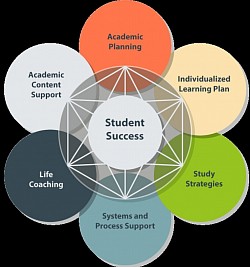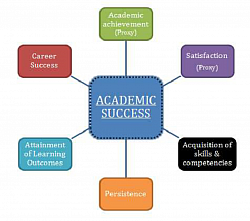APEX BLOG : INSIGHT AND STRATEGIES
Title: The Apex of Student Success
Title: The Apex of Student Success:
A Comprehensive Guide to Thriving in Academia
In the rapidly evolving landscape of education, student success has become a focal point for educators, institutions, and learners alike. The concept of "Apex Student Success" encapsulates a holistic approach that empowers students to reach their highest potential, both academically and personally. This blog page aims to explore the various dimensions of student success, providing insights, strategies, and resources that can help students navigate their academic journeys effectively.
▎Understanding Apex Student Success
At its core, Apex Student Success refers to the peak of achievement that a student can attain during their educational experience. It is not merely about grades or test scores; rather, it encompasses a well-rounded development of skills, knowledge, and personal growth. The apex of student success includes several key components:
1. Academic Excellence: Achieving high grades and mastering subject material is fundamental. However, academic excellence is best understood as a combination of understanding concepts, critical thinking, and the ability to apply knowledge in practical situations.
2. Personal Development: Beyond academics, personal growth plays a crucial role in student success. This includes developing soft skills such as communication, teamwork, and leadership, which are essential for future endeavors in both professional and personal spheres.
3. Emotional Well-being: Mental health awareness has become increasingly important in educational settings. Students must learn to manage stress, build resilience, and seek help when needed. Emotional well-being is integral to sustaining motivation and focus throughout their studies.
4. Community Engagement: Building connections with peers, faculty, and the broader community enriches the educational experience. Engaging in extracurricular activities, volunteering, or participating in student organizations fosters a sense of belonging and enhances social skills.
5. Career Preparation: As students approach graduation, career readiness becomes a pressing concern. Developing a clear understanding of career goals, networking with professionals, and gaining practical experience through internships are vital steps toward ensuring a successful transition from academia to the workforce.
▎Strategies for Achieving Apex Student Success
To assist students on their journey toward apex success, this blog page will provide actionable strategies across various dimensions:
1. Effective Study Habits:
• Time Management: Utilize planners or digital tools to prioritize tasks and manage deadlines effectively.
• Active Learning Techniques: Engage with material through discussions, teaching others, or applying concepts in real-world scenarios.
2. Building Resilience:
• Mindfulness Practices: Incorporate mindfulness or meditation into daily routines to enhance focus and reduce anxiety.
• Goal Setting: Set SMART (Specific, Measurable, Achievable, Relevant, Time-bound) goals to maintain motivation and track progress.
3. Networking and Mentorship:
• Seek Mentors: Connect with professors or professionals in your field who can provide guidance and support.
• Join Professional Organizations: Participate in clubs or associations related to your career interests to expand your network.
4. Utilizing Campus Resources:
• Academic Support Services: Take advantage of tutoring centers, writing labs, and libraries to enhance learning.
• Counseling Services: Access mental health resources offered by the institution to promote emotional well-being.
5. Engaging in Extracurricular Activities:
• Volunteer Opportunities: Get involved in community service projects that align with personal interests and values.
• Leadership Roles: Take on leadership positions within student organizations to develop management skills and confidence.
▎Conclusion
The journey toward apex student success is multifaceted and unique to each individual. By recognizing the importance of academic excellence, personal development, emotional well-being, community engagement, and career preparation, students can create a balanced approach to their education. This blog page serves as a resource for students seeking guidance and inspiration as they strive to reach their highest potential. Embracing the principles of apex student success not only prepares students for academic achievements but also equips them with the skills necessary for lifelong success in an ever-changing world.
APEX STUDENT SUCCESS HUB FOR MEDICAL STUDENT
# Online Educational Resources for Medical Students at Apex Study Success
Welcome to the Apex Study Success online resource hub! This page is designed to provide medical students with valuable links and resources, categorized by major courses from pre-medicine through to specialization. Each section includes recommended reference materials and effective study techniques tailored to help you excel in your coursework.
### Anatomy
**Resources:**
- **Websites:**
- [AnatomyZone](https://www.anatomyzone.com/) – An interactive resource with videos and animations.
- [Online Anatomy Resource](https://www.visiblebody.com/) – A 3D interactive anatomy platform.
**Best References:**
- **Textbook:** “Gray’s Anatomy: The Anatomical Basis of Clinical Practice” by Henry Gray.
- **Atlas:** “Netter’s Atlas of Human Anatomy” by Frank H. Netter.
**Study Techniques:**
- **Visual Learning:** Use 3D models and interactive programs to visualize complex structures.
- **Repetition:** Regularly review anatomical terms and structures using flashcards.
- **Diagrams:** Draw out anatomical diagrams from memory to reinforce learning.
### Biochemistry
**Resources:**
- **Websites:**
- [Khan Academy - Biochemistry](https://www.khanacademy.org/science/biochemistry) – Video tutorials and exercises.
- [Biochemistry Free and Easy](http://www.biochemistry.org/) – Accessible biochemistry tutorials.
**Best References:**
- **Textbook:** “Lehninger Principles of Biochemistry” by David L. Nelson and Michael M. Cox.
**Study Techniques:**
- **Concept Maps:** Create visual maps linking biochemical pathways.
- **Practice Questions:** Regularly attempt past exam questions to reinforce concepts.
- **Interleaved Practice:** Mix biochemistry topics to improve retention and understanding.
### Pharmacology
**Resources:**
- **Websites:**
- [Pharmacology World](https://www.pharmacologyworld.com/) – Comprehensive pharmacology materials.
- [Memrise](https://www.memrise.com/) – Engaging way to memorize drug classifications and mechanisms.
**Best References:**
- **Textbook:** “Goodman & Gilman’s: The Pharmacological Basis of Therapeutics” by Laurence Brunton.
- **Drug Reference:** “Martindale: The Complete Drug Reference.”
**Study Techniques:**
- **Flashcards:** Create flashcards for drug names, classes, and side effects.
- **Clinical Case Studies:** Apply pharmacological concepts to real case scenarios for contextual learning.
- **Group Study:** Discuss pharmacokinetics and pharmacodynamics with peers for better retention.
### Pathology
**Resources:**
- **Websites:**
- [Pathology Outlines](http://www.pathologyoutlines.com/) – A free online pathology textbook.
- [WebPath](http://www.webpathology.com/) – An online pathology resource with cases and slides.
**Best References:**
- **Textbook:** “Robbins and Cotran Pathologic Basis of Disease” by Vinay Kumar.
**Study Techniques:**
- **Case-Based Learning:** Study clinical cases to understand disease mechanisms and outcomes.
- **Visual Aids:** Use diagrams and slides to comprehend histopathological features.
- **Synthesis Summaries:** Consolidate information into summary sheets for quick reviews.
### Physiology
**Resources:**
- **Websites:**
- [Physiology Web](http://www.physiologyweb.com/) – Offers lectures, quizzes, and other resources.
- [The Physiology Society](https://www.physoc.org/) – Provides access to research and educational materials.
**Best References:**
- **Textbook:** “Guyton and Hall Textbook of Medical Physiology” by John E. Hall.
**Study Techniques:**
- **Flow Charts:** Create flow charts to illustrate physiological processes and feedback loops.
- **Interactive Media:** Utilize simulations or animations to grasp dynamic processes.
- **Peer Teaching:** Teach difficult concepts to classmates to reinforce your understanding.
### Conclusion
Each medical subject requires specific resources and study techniques to master the material effectively. By utilizing these online resources and following the recommended study approaches, you can enhance your understanding and performan
ce in your medical education.
Feel free to bookmark this page, share it with your classmates, and comment below if you have additional resources or strategies to share! Happy studying!
Forwarded from # Online Educational Resources for Medical Students at Apex Study Success Welcome to the Apex Study Success online resource hub! This page is designed to provide medical students with valuable links and resources, categorized by major courses from pre-medicine through to specialization. Each section includes recommended reference materials and effective study techniques tailored to help you excel in your coursework. ### Anatomy **Resources:** - **Websites:** - [AnatomyZone](https://www.anatomyzone.com/) – An interactive resource with videos and animations. - [Online Anatomy Resource](https://www.visiblebody.com/) – A 3D interactive anatomy platform. **Best References:** - **Textbook:** “Gray’s Anatomy: The Anatomical Basis of Clinical Practice” by Henry Gray. - **Atlas:** “Netter’s Atlas of Human Anatomy” by Frank H. Netter. **Study Techniques:** - **Visual Learning:** Use 3D models and interactive programs to visualize complex structures. - **Repetition:** Regularly review anatomical terms and structures using flashcards. - **Diagrams:** Draw out anatomical diagrams from memory to reinforce learning. ### Biochemistry **Resources:** - **Websites:** - [Khan Academy - Biochemistry](https://www.khanacademy.org/science/biochemistry) – Video tutorials and exercises. - [Biochemistry Free and Easy](http://www.biochemistry.org/) – Accessible biochemistry tutorials. **Best References:** - **Textbook:** “Lehninger Principles of Biochemistry” by David L. Nelson and Michael M. Cox. **Study Techniques:** - **Concept Maps:** Create visual maps linking biochemical pathways. - **Practice Questions:** Regularly attempt past exam questions to reinforce concepts. - **Interleaved Practice:** Mix biochemistry topics to improve retention and understanding. ### Pharmacology **Resources:** - **Websites:** - [Pharmacology World](https://www.pharmacologyworld.com/) – Comprehensive pharmacology materials. - [Memrise](https://www.memrise.com/) – Engaging way to memorize drug classifications and mechanisms. **Best References:** - **Textbook:** “Goodman & Gilman’s: The Pharmacological Basis of Therapeutics” by Laurence Brunton. - **Drug Reference:** “Martindale: The Complete Drug Reference.” **Study Techniques:** - **Flashcards:** Create flashcards for drug names, classes, and side effects. - **Clinical Case Studies:** Apply pharmacological concepts to real case scenarios for contextual learning. - **Group Study:** Discuss pharmacokinetics and pharmacodynamics with peers for better retention. ### Pathology **Resources:** - **Websites:** - [Pathology Outlines](http://www.pathologyoutlines.com/) – A free online pathology textbook. - [WebPath](http://www.webpathology.com/) – An online pathology resource with cases and slides. **Best References:** - **Textbook:** “Robbins and Cotran Pathologic Basis of Disease” by Vinay Kumar. **Study Techniques:** - **Case-Based Learning:** Study clinical cases to understand disease mechanisms and outcomes. - **Visual Aids:** Use diagrams and slides to comprehend histopathological features. - **Synthesis Summaries:** Consolidate information into summary sheets for quick reviews. ### Physiology **Resources:** - **Websites:** - [Physiology Web](http://www.physiologyweb.com/) – Offers lectures, quizzes, and other resources. - [The Physiology Society](https://www.physoc.org/) – Provides access to research and educational materials. **Best References:** - **Textbook:** “Guyton and Hall Textbook of Medical Physiology” by John E. Hall. **Study Techniques:** - **Flow Charts:** Create flow charts to illustrate physiological processes and feedback loops. - **Interactive Media:** Utilize simulations or animations to grasp dynamic processes. - **Peer Teaching:** Teach difficult concepts to classmates to reinforce your understanding. ### Conclusion Each medical subject requires specific resources and study techniques to master the material effectively. By utilizing these online resources and following the recommended study approaches, you can enhance your understanding and performan ce in your medical education. Feel free to bookmark this page, share it with your classmates, and comment below if you have additional resources or strategies to share! Happy studying! Forwarded from




